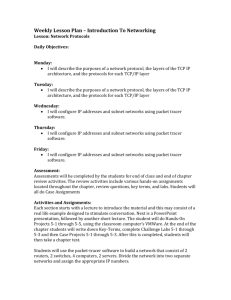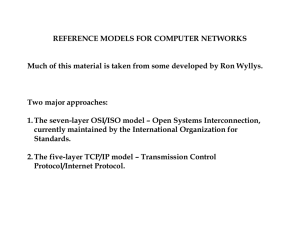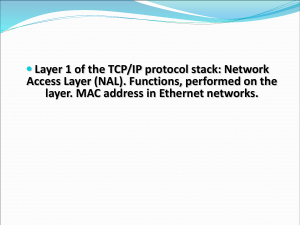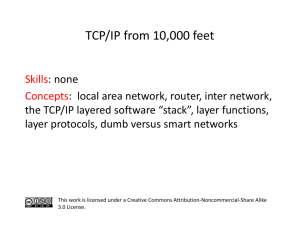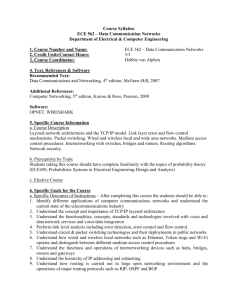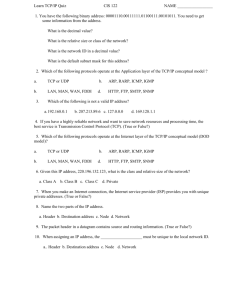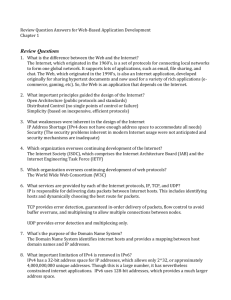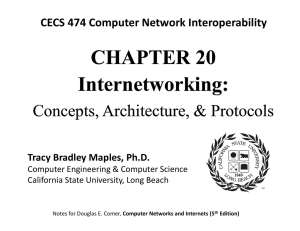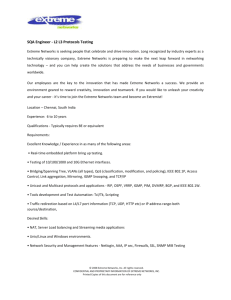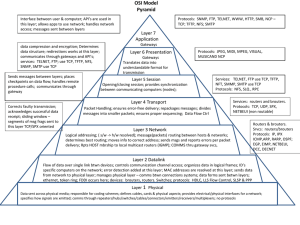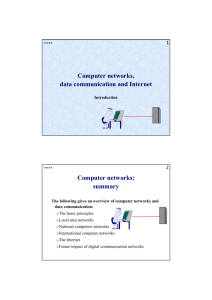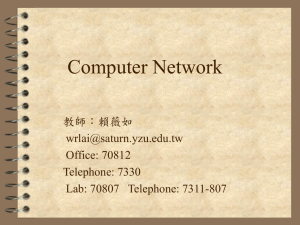CST3607 Interconnectivity Course Description - NYC Tech
advertisement
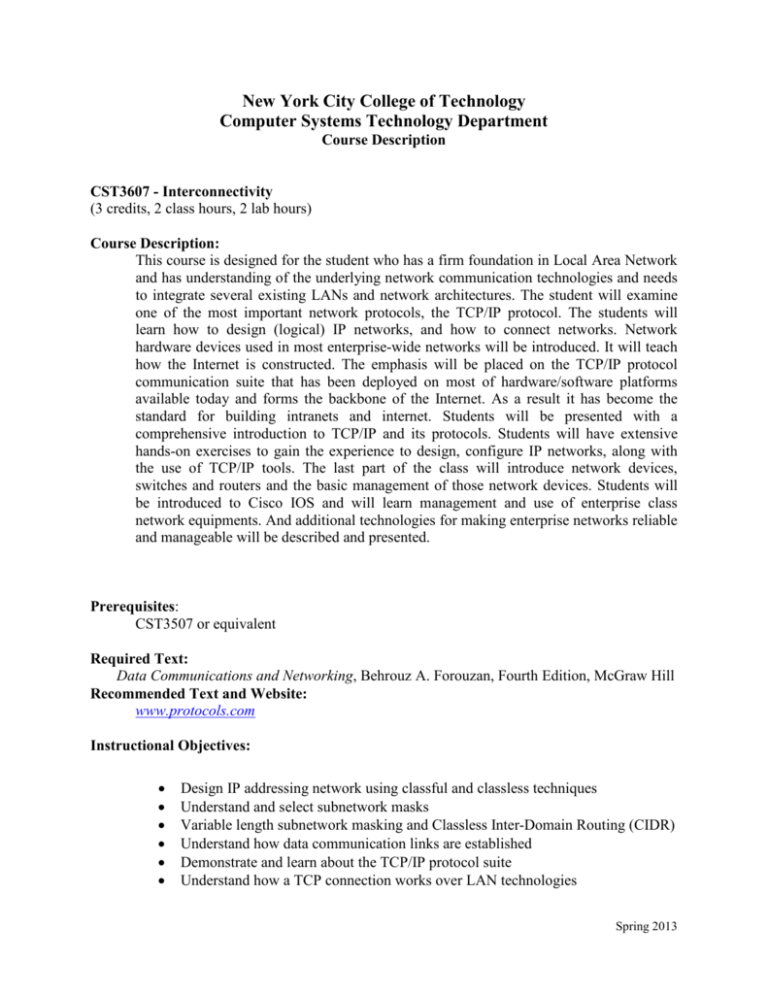
New York City College of Technology Computer Systems Technology Department Course Description CST3607 - Interconnectivity (3 credits, 2 class hours, 2 lab hours) Course Description: This course is designed for the student who has a firm foundation in Local Area Network and has understanding of the underlying network communication technologies and needs to integrate several existing LANs and network architectures. The student will examine one of the most important network protocols, the TCP/IP protocol. The students will learn how to design (logical) IP networks, and how to connect networks. Network hardware devices used in most enterprise-wide networks will be introduced. It will teach how the Internet is constructed. The emphasis will be placed on the TCP/IP protocol communication suite that has been deployed on most of hardware/software platforms available today and forms the backbone of the Internet. As a result it has become the standard for building intranets and internet. Students will be presented with a comprehensive introduction to TCP/IP and its protocols. Students will have extensive hands-on exercises to gain the experience to design, configure IP networks, along with the use of TCP/IP tools. The last part of the class will introduce network devices, switches and routers and the basic management of those network devices. Students will be introduced to Cisco IOS and will learn management and use of enterprise class network equipments. And additional technologies for making enterprise networks reliable and manageable will be described and presented. Prerequisites: CST3507 or equivalent Required Text: Data Communications and Networking, Behrouz A. Forouzan, Fourth Edition, McGraw Hill Recommended Text and Website: www.protocols.com Instructional Objectives: • • • • • • Design IP addressing network using classful and classless techniques Understand and select subnetwork masks Variable length subnetwork masking and Classless Inter-Domain Routing (CIDR) Understand how data communication links are established Demonstrate and learn about the TCP/IP protocol suite Understand how a TCP connection works over LAN technologies Spring 2013 • Understand, install, test and manage TCP/IP services • Implement layered network communication protocols and utilize packet switching techniques • Understanding the roles and functions of routing and switching technologies in order to design and configure today’s rapidly evolving networks Multi-platform networks Understand the TCP/IP protocols Introduction to Cisco Internetworking Operating System Configure layer-2 devices in order to implement and manage a LAN Configure layer3 devices in order to implement LAN to LAN connections • • • • • General Education Outcomes: • SKILLS/Inquiry/Analysis: Students will employ scientific reasoning and logical thinking. • SKILLS/Communication: Students will communicate in diverse settings and groups, using written (both reading and writing), oral (both speaking and listening), and visual means • VALUES, ETHICS, RELATIONSHIPS / Professional/Personal Development: Students will work with teams, including those of diverse composition. Build consensus. Respect and use creativity. Discern consequences of decisions and actions. Academic Integrity Policy: Students and all others who work with information, ideas, texts, images, music, inventions, and other intellectual property owe their audience and sources accuracy and honesty in using, crediting, and citing sources. As a community of intellectual and professional workers, the College recognizes its responsibility for providing instruction in information literacy and academic integrity, offering models of good practice, and responding vigilantly and appropriately to infractions of academic integrity. Accordingly, academic dishonesty is prohibited in The City University of New York and at New York City College of Technology and is punishable by penalties, including failing grades, suspension, and expulsion. The complete text of the College policy on Academic Integrity may be found in the catalog. Grade: Tests Final Quizzes Lab Assignments TOTAL 30% 30% 10% 30% ===== 100% Spring 2013 Letter Grade Numerical Grade A A- B+ B B- C+ C D F 93100 9092.9 8789.9 8386.9 8082.9 7779.9 7076.9 6069.9 <=59.9 Course Outline: Week 1 2 3 4 5 6,7 8 Topics What is networking? LAN - WAN-MAN Review: OSI Model, Layer 2 Technologies The TCP/IP communication stack Logical Addressing, Network Addresses IP Addressing IP Addressing: Subneting, CIDR More on CIDR, Supernet and Traffic Analysis 9 10 11 12 MidTerm The IP protocol Connection Oriented Transport Protocol Connection-Less Oriented Protocol and Internet Control Messaging Protocol Network Services: DHCP, DNS Introduction to Cisco Devices and management Final Exam 13 14 15 Reading Assessment Criteria: For the successful completion of this course a student should be able to: Demonstrate understanding of the TCP/IP suite protocol. Evaluation methods and criteria Written examination Demonstrate skills in designing an IP network and IP addressing schema, CIDR Demonstrate analytical skills in configuring servers. Written test and practical test by implementing the schema in the lab Hands-on labs: Deploying a Windows 2008 Server Understand, install, test and manage TCP/IP Installing and using a software protocol analyzer services Understanding the roles and functions of routing and switching technologies in order to design and configure today’s rapidly evolving networks Quizzes and Test Deploy DHCP, Understand and select proper sub-networks masks. Practical labs and quizz Spring 2013 Perform various network troubleshooting and monitoring Demonstrate understanding of internetwork connections and Implement and test the connections. Use of protocol analyzer software applications Hands-on lab assignment and use of troubleshooting utilities. General Education Outcomes and Assessment: Learning Outcomes SKILLS/Inquiry/Analysis Students will employ scientific reasoning and logical thinking. SKILLS/Communication Students will communicate in diverse settings and groups, using written (both reading and writing), oral (both speaking and listening), and visual means. VALUES, ETHICS, RELATIONSHIPS / Professional/Personal Development Students will work with teams, including those of diverse composition. Build consensus. Respect and use creativity. Discern consequences of decisions and actions Evaluation methods and criteria Read research publications, analyze local area network requirements, and propose an practical network addressing schema. Students will work in group of 3, creating their own LAN based on Microsoft server 2008, apply IP policies, and briefly present their implementation, Lab project and assignments in which students will work on different network settings and understand business requirements and translate them into system administration policies. Spring 2013
